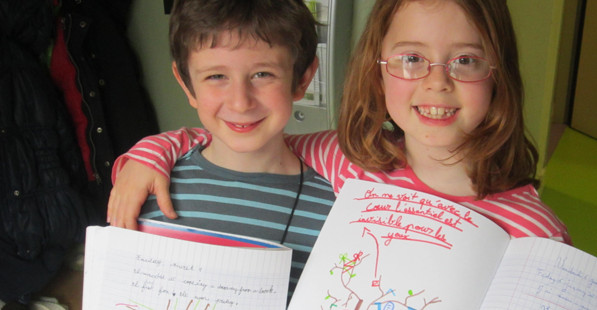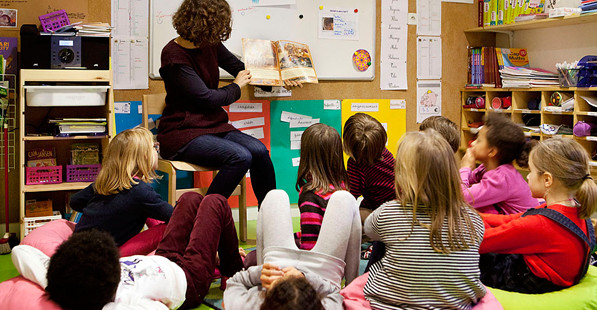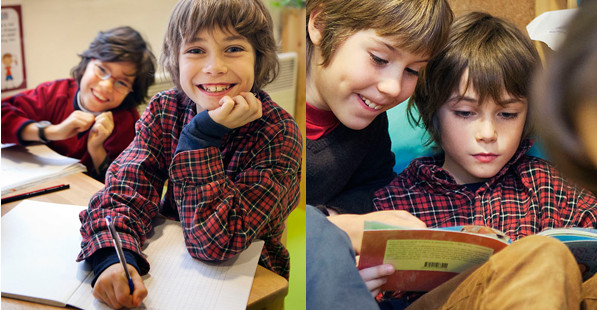Learning at Living School
Fun and joy
Our point of departure is the principle that having fun and experiencing joy are the most powerful driving forces behind learning. We offer engaging pedagogical experiences, giving children the desire to learn with their natural motivation and not because of rigid rules or obligations.

Meaning
At Living School, we leave abstraction behind and discover meaning. It is more important to understand than to just know a given a fact. It’s not about ingesting a plethora of abstract facts in order to regurgitate them for an evaluation; instead, the important thing is to understand and to integrate knowledge and skills and, as much as possible, knowledge and skills useful for a fulfilled life. As a result, the students carry out their own work and we join together knowledge areas in an interdisciplinary way. For example, we offer children at the primary level workshops in the sciences. Through their own experiences, they will discover the chemistry behind cleaning one day, the different states of matter the next, or maybe all about photosynthesis… We also give meaning to all learning areas thanks to eco-citizenship projects lead by the children. For example:
When the children contributed to replanting trees in Senegal, we launched a correspondence project with the children in the nearby village. The children in kindergarten (GS) and first grade (CP) levels developed a deep motivation to read and write in order to exchange with other children from far away.
When the children wanted to save the bonobo monkeys, they propelled themselves into a huge collection of coins. This project was the opportunity for numerous lessons in mathematics to count and save all that change!
Active pedagogy and material
The pedagogical team uses active pedagogy and material as much as possible.
In pre-school, we use some Montessori material that allows children to rejoin concepts of size, to conduct sorting or to develop their fine motor skills…
In grande section and CP, we use the Méthode des Alphas to learn to read, a method developed by a Swiss psychopedagogue, Claude Huguenin. It is a motivating method for children and teachers alike. Through an enchanting tale, children discover characters in the shape and form of letters that each has its own distinctive sound. Instead of learning one sound per day, a method in more classical styles, children learn the first 16 sounds in just a few lessons. Through playing and enjoying the Alphas, children then learn to combine the sounds and then understand the concept of the alphabet. The results are highly efficient and inspiring! We combine this method with a phonetic-physical method called Borel-Maisonny, which fosters a rich integration of the sounds. In combining these two approaches, we tap into the entire learning range: visual, audio and kinesthetic. In this way, no child is marginalized during this pivotal time of learning to read.

For mathematics, we use cooking instruments that help children to learn through manipulation to grasp differences in size, additions and subtractions and atrimaths. In cycle 2, the straw exercise allows children to concretely handle notions of units and place values, and to link these numbers with quantities. Each day at school, one child adds a straw to the jar of straws and recounts them. We celebrate the moment when we reach 30 straws, 50 straws and even 100 straws!
Our teachers and the children also use the interactive whiteboard for lessons in French, Math, History or English…
Fair evaluation
There are no grades at Living School, no competition, and no class rank. Evaluation at Living School allows each child to know precisely where he/she stands with respect to the skill levels required by the National Education Program and those expected by our school. Evaluation is thus being introduced through the « Skill Belt » method in each subject. Inspired by the Pédagogie Institutionnelle, the belts allow children to place themselves, wherever that might be, in relation to the skills expected of them. At the end of the year, we provide a complete booklet to each child that summarizes the savoir-être of each child as well as the more academic subjects.
